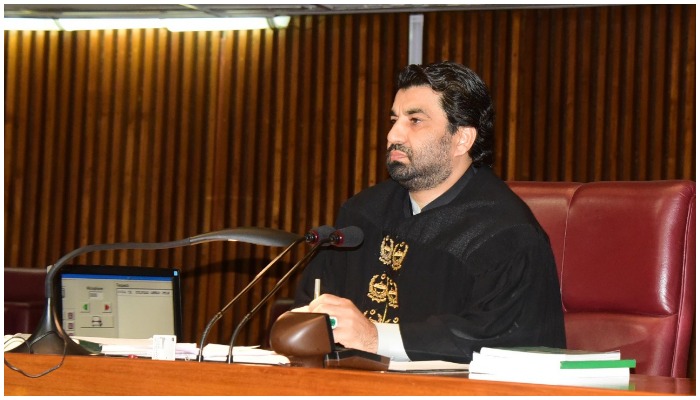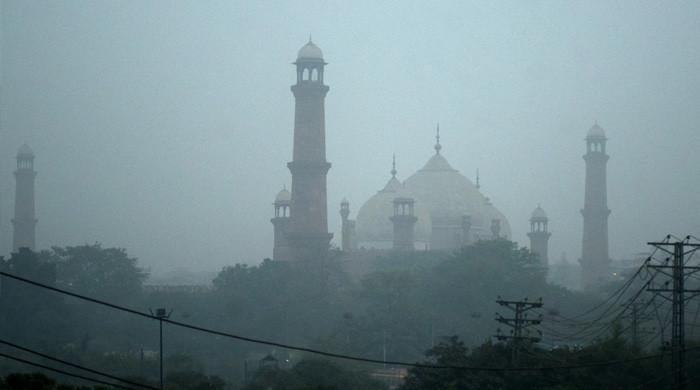Who is the real author of the deputy speaker’s ruling?
While reading from a note, the deputy speaker named speaker Asad Qaiser as the author
April 05, 2022

What happened on April 3, in the National Assembly will be filed in Pakistan's charred political history as one of the most controversial rulings within the parliament.
Rejecting the vote of no-confidence against Prime Minister Imran Khan, on the grounds that it was part of an international conspiracy, has further deepened the political and constitutional crises in the country.
The ruling was certainly not the ruling of the man who chaired the session that day, therefore the deputy speaker. In fact, while reading from a note, the deputy speaker named speaker Asad Qaiser as the author.
But if it was indeed Qaiser’s ruling, why would he have written it if he knew he could not have chaired the session due to a pending vote of no-confidence against him too?
So, who is the actual author?
Fawad Chaudhry, who was made law minister for for a short while issued two directives. One, he asked the Federal Investigation Agency (FIA) to file an application for the cancellation of Shehbaz Sharif’s bail.
Sharif was the Opposition's candidate for the prime minister office, if the vote of no-confidence had succeeded.
The second order, Chaudhry passed, was for the formation of a Commission of Inquiry to probe the alleged international conspiracy behind the vote of no-confidence. Also, it was Chaudhry who raised the question, on point of order, that under Article V, clause 1, the vote of no-confidence can’t be taken up as it is an international conspiracy to dislodge the government.
Those privy to the developments of that day tell me that members of the prime minister’s legal team were against using Article V, clause 1, as the speaker had already declared the motion in order on March 24.
Before the vote, Prime Minister Imran Khan had a clear idea that he had lost the confidence of the Lower House, after the departure of his allies including Muttahida Qaumi Movement-Pakistan, Balochistan Awami Party and Tariq Bashir Cheema and Salik Hussain from the Pakistan Muslim League-Q.
Even without floor-crossers from the PTI, the Opposition had the winning numbers of 177, more than the required 172 needed to vote Khan out.
Now, Prime Minister Khan has often told us that he knows the West better than anyone else. Then he must know that in Western democracies resignation on the ground of losing the confidence of the House or in the case of serious allegations is always considered a graceful exit for the head of the government.
Well-informed sources told me that there was a division within the top hierarchy of the ruling party on the vote of no-trust. Then, Najeeb Haroon from Karachi suggested to Khan that someone within the party be nominated as leader of the House, therefore prime minister, instead, as a last resort to save the government. The idea was rejected by the prime minister.
Apart from Islamabad, trouble for the ruling party and Prime Minister Khan is also brewing in Punjab.
Khan had to sacrifice his chief minister Usman Buzdar and handed over the province to the PML-Q’s Parvez Elahi, which many considered a belated move.
But that hasn’t helped him yet. There has been a raft of allegations against Khan this week by his own party members, such as former governor Punjab Mohammad Sarwar and former Punjab minister Aleem Khan.
Khan is now dependent on Elahi to prevent Punjab from falling into the hands of his rival political party.
Meanwhile, Prime Minister Khan is also seeking fresh polls in 90 days. It is unclear if that can happen as the Election Commission of Pakistan’s composition is incomplete. Two of its members from Khyber Pakhtunkhwa and Punjab are yet to be nominated. Then, there is the question of delimitation of constituencies and of electronic voting.
With general elections all but certain to be held this year, the political and economic uncertainty may continue.











